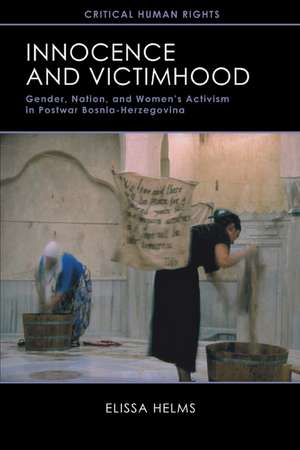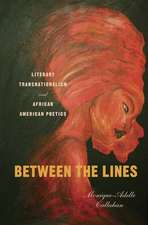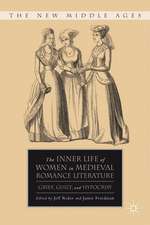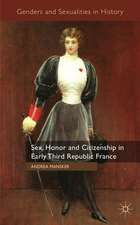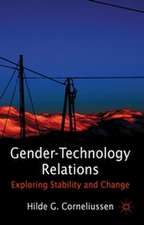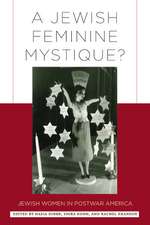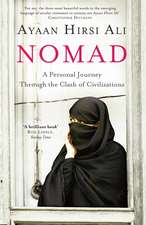Innocence and Victimhood: Gender, Nation, and Women’s Activism in Postwar Bosnia-Herzegovina: Critical Human Rights
Autor Elissa Helmsen Limba Engleză Paperback – 14 dec 2013
Drawing on ethnographic research spanning fifteen years, Innocence and Victimhood demonstrates how women’s activists and NGOs responded to, challenged, and often reinforced essentialist images in affirmative ways, utilizing the moral purity associated with the position of victimhood to bolster social claims, shape political visions, pursue foreign funding, and wage campaigns for postwar justice. Deeply sensitive to the suffering at the heart of Bosnian women’s (and men’s) wartime experiences, this book also reveals the limitations to strategies that emphasize innocence and victimhood.
Din seria Critical Human Rights
-
 Preț: 167.81 lei
Preț: 167.81 lei -
 Preț: 171.14 lei
Preț: 171.14 lei -
 Preț: 257.44 lei
Preț: 257.44 lei -
 Preț: 234.39 lei
Preț: 234.39 lei -
 Preț: 159.02 lei
Preț: 159.02 lei -
 Preț: 201.83 lei
Preț: 201.83 lei -
 Preț: 189.99 lei
Preț: 189.99 lei -
 Preț: 311.92 lei
Preț: 311.92 lei -
 Preț: 254.11 lei
Preț: 254.11 lei -
 Preț: 225.80 lei
Preț: 225.80 lei -
 Preț: 258.01 lei
Preț: 258.01 lei - 23%
 Preț: 473.27 lei
Preț: 473.27 lei -
 Preț: 179.28 lei
Preț: 179.28 lei -
 Preț: 176.61 lei
Preț: 176.61 lei -
 Preț: 177.37 lei
Preț: 177.37 lei -
 Preț: 235.78 lei
Preț: 235.78 lei - 23%
 Preț: 452.84 lei
Preț: 452.84 lei -
 Preț: 221.81 lei
Preț: 221.81 lei -
 Preț: 213.29 lei
Preț: 213.29 lei -
 Preț: 237.55 lei
Preț: 237.55 lei -
 Preț: 231.15 lei
Preț: 231.15 lei - 23%
 Preț: 472.22 lei
Preț: 472.22 lei -
 Preț: 180.25 lei
Preț: 180.25 lei -
 Preț: 510.83 lei
Preț: 510.83 lei - 23%
 Preț: 474.60 lei
Preț: 474.60 lei - 23%
 Preț: 473.72 lei
Preț: 473.72 lei - 23%
 Preț: 590.00 lei
Preț: 590.00 lei - 23%
 Preț: 477.70 lei
Preț: 477.70 lei - 23%
 Preț: 472.37 lei
Preț: 472.37 lei - 11%
 Preț: 230.06 lei
Preț: 230.06 lei - 13%
 Preț: 200.36 lei
Preț: 200.36 lei - 19%
 Preț: 437.91 lei
Preț: 437.91 lei
Preț: 233.54 lei
Nou
Puncte Express: 350
Preț estimativ în valută:
44.69€ • 48.53$ • 37.54£
44.69€ • 48.53$ • 37.54£
Carte tipărită la comandă
Livrare economică 22 aprilie-06 mai
Preluare comenzi: 021 569.72.76
Specificații
ISBN-13: 9780299295547
ISBN-10: 0299295540
Pagini: 348
Ilustrații: 21 b-w photos, 1 map
Dimensiuni: 152 x 229 x 25 mm
Greutate: 0.48 kg
Ediția:1
Editura: University of Wisconsin Press
Colecția University of Wisconsin Press
Seria Critical Human Rights
ISBN-10: 0299295540
Pagini: 348
Ilustrații: 21 b-w photos, 1 map
Dimensiuni: 152 x 229 x 25 mm
Greutate: 0.48 kg
Ediția:1
Editura: University of Wisconsin Press
Colecția University of Wisconsin Press
Seria Critical Human Rights
Recenzii
“Undertaking what might be deemed an ‘anthropology of difficult truths,’ Elissa Helms unflinchingly examines the contradictions of women’s activism in contemporary Bosnia-Herzegovina. This sobering book is as courageous and complex as the women who populate its pages.”—Pamela Ballinger, University of Michigan
“This is a brave and important book of significance both for our understanding of postwar Bosnia-Herzegovina and for what it says about the unintended consequences of initiatives aimed at improving the lot of women and society as a whole in a post-conflict environment.”—Wendy Bracewell, University College London
“Nuanced, comprehensive, analytical, theoretical, challenging, and carefully constructed—this book takes on nationalism, feminism, gender, ethnicity, and faith as the author addresses the history of the recent Bosnia-Herzegovina war and its varied impacts on a range of social actors.”—H-Nationalism
“Important and controversial material. . . . According to Helms, the discourse of ethnic rapes ‘can often mask profoundly patriarchal ideologies and notions of irreconcilable ethno-national differences.’”—Slavic Review
“The greatest merit of Helms’ book is her unravelling of ambiguities, of rigid connectivities, and [of] how multiple women’s groups were trying to come to terms with human rights, entitlement claims, and also with frictions between each other and among staff. . . . An impressive example of excellent action research.”—European Journal of Women’s Studies
“This book is a wonderful corrective, one that gives an in-depth look at the complexities of Bosnian society through the lens of women activists.”—International Studies Review
Notă biografică
Elissa Helms is associate professor of gender studies at Central European University in Hungary. She is a coeditor, with Xavier Bougarel and Ger Duijzings, of The New Bosnian Mosaic: Identities, Memories and Moral Claims in a Post-War Society.
Cuprins
List of Illustrations
Acknowledgments
Pronunciation Guide
List of Abbreviations
Introduction
1 Representations: Victims and Peacemakers
2 Wartime: Gender, Nationalism, and Mass Rape
3 The NGO "Boom": Women's Organizing and Foreign Intervention in the Wake of War
4 The "Nation-ing" of Gender: Nationalism, Ethnicity, Reconciliation
5 "Politics Is a Whore": Women and the Political
6 Avoidance and Authenticity: The Public Face of Wartime Rape
Conclusion: Claiming Gendered Victimhood: Limits, Implications, Hopes
Notes
References
IndexDescriere
The 1992–95 war in Bosnia-Herzegovina following the dissolution of socialist Yugoslavia became notorious for “ethnic cleansing” and mass rapes targeting the Bosniac (Bosnian Muslim) population. Postwar social and political processes have continued to be dominated by competing nationalisms representing Bosniacs, Serbs, and Croats, as well as those supporting a multiethnic Bosnian state, in which narratives of victimhood take center stage, often in gendered form. Elissa Helms shows that in the aftermath of the war, initiatives by and for Bosnian women perpetuated and complicated dominant images of women as victims and peacemakers in a conflict and political system led by men. In a sober corrective to such accounts, she offers a critical look at the politics of women’s activism and gendered nationalism in a postwar and postsocialist society.
Drawing on ethnographic research spanning fifteen years, Innocence and Victimhood demonstrates how women’s activists and NGOs responded to, challenged, and often reinforced essentialist images in affirmative ways, utilizing the moral purity associated with the position of victimhood to bolster social claims, shape political visions, pursue foreign funding, and wage campaigns for postwar justice. Deeply sensitive to the suffering at the heart of Bosnian women’s (and men’s) wartime experiences, this book also reveals the limitations to strategies that emphasize innocence and victimhood.
